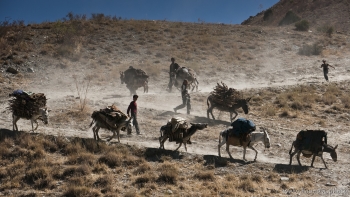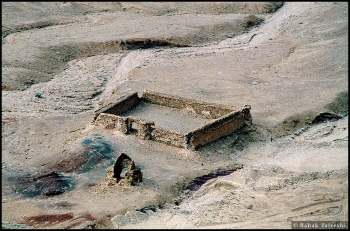
 |

 350x254.jpg) |
| In ancient times many diverse skin diseases were lumped together as tzâ•raꞋat, from white or yellow patches or white hairs to various types of plastic-like, loose skin, nodules and sores. (Only later was the original Hebrew term Hellenized to mean "leprosy.") Photo: ring worm fungus, American Academy of Dermatology (aad.org) |
Then, as an added measure, the ma•lâkhꞋ![]() é‑‑ä taught Mosh•ëhꞋ another priestly magic illusion.
é‑‑ä taught Mosh•ëhꞋ another priestly magic illusion.
"Let me show you something here," the ma•lâkhꞋ![]() é‑‑ä suggested, handing Mosh•ëhꞋ the ugliest glove he'd ever seen.
é‑‑ä suggested, handing Mosh•ëhꞋ the ugliest glove he'd ever seen.
"This glove is made from the intestines of a goat. Fasten it inside your kaftan. Now," the ma•lâkhꞋ![]() é‑‑ä instructed, "as you put your hand inside your kaftan, slide you hand into the glove. Now, pull out your hand and, Poof! Your hand appears afflicted with tzâ•raꞋat, like snow has settled on your hand!
é‑‑ä instructed, "as you put your hand inside your kaftan, slide you hand into the glove. Now, pull out your hand and, Poof! Your hand appears afflicted with tzâ•raꞋat, like snow has settled on your hand!
"Ok," the ma•lâkhꞋ![]() é‑‑ä continued, "Now put your hand back into your kaftan and slide your hand out of the glove, leaving the glove inside your kaftan. Voila! Your hand is normal again!"
é‑‑ä continued, "Now put your hand back into your kaftan and slide your hand out of the glove, leaving the glove inside your kaftan. Voila! Your hand is normal again!"
"If they aren't convinced by the snake scepter illusion, this oughtta do it," the ma•lâkhꞋ![]() é‑‑ä declared confidently.
é‑‑ä declared confidently.
 |
| "Magic" pitcher. Cover the outside of a standard Brita filter pitcher and plug up the filter hole. Fill the bottom section (only) with, say, pomegranate juice and leave the top section empty. Now you can pour in water at the top, but it will pour out pomegranate juice. |
"If they don't believe these two signs, nor listen to what you say, then you can use this special pitcher with two compartments inside. Beforehand, you pour some goat's blood into the bottom-forward compartment. Then, while they watch, you pour in some water from their sacred Nile into the top-rear compartment. When you pour from the spout, the blood in the bottom compartment comes out while the water in the top compartment is blocked. So the blood pours out on dry land."
Then Mosh•ëhꞋ said to [the ma•lâkhꞋ![]() ] é‑‑ä, "Please A•don•âiꞋ,
] é‑‑ä, "Please A•don•âiꞋ,![]() I've never been a man of diplomatic rhetoric. Not yesterday. Not the day before. Not from the first time You ever spoke to your worker. For I, myself, am a man of Egyptian-tongue and action, not Hebrew-tongued diplomacy – I say what I mean and mean what I say; strictly serious of mouth and serious of tongue."
I've never been a man of diplomatic rhetoric. Not yesterday. Not the day before. Not from the first time You ever spoke to your worker. For I, myself, am a man of Egyptian-tongue and action, not Hebrew-tongued diplomacy – I say what I mean and mean what I say; strictly serious of mouth and serious of tongue."
"Consider the Creator's point of view," the ma•lâkhꞋ![]() é‑‑ä responded, still speaking in the Name. "Who puts the mouth in a man? Who puts muteness in a man? Or deafness? Or sharp-sightedness? Or blindness? Is it not Me, Myself – é‑‑ä? Now go! I Myself, àÆäÀéÆä, will coach your strategy and I will instruct you what to speak."
é‑‑ä responded, still speaking in the Name. "Who puts the mouth in a man? Who puts muteness in a man? Or deafness? Or sharp-sightedness? Or blindness? Is it not Me, Myself – é‑‑ä? Now go! I Myself, àÆäÀéÆä, will coach your strategy and I will instruct you what to speak."
"I'd prefer you send the message by whomever else you wish," Mosh•ëhꞋ replied.
This angered the ma•lâkhꞋ![]() é‑‑ä. Continuing to speak in the third person as ko•heinꞋ of é‑‑ä, he chided Mosh•ëhꞋ sarcastically. "Isn't your brother, A•ha•ronꞋ, a Lei•wiꞋ? Doesn't he speak fluent Hebrew? Furthermore, hasn't he gone out calling you? Isn't he elated to see you? You tell him the gist. àÆäÀéÆä will coach both you and him and I will instruct you what to do.
é‑‑ä. Continuing to speak in the third person as ko•heinꞋ of é‑‑ä, he chided Mosh•ëhꞋ sarcastically. "Isn't your brother, A•ha•ronꞋ, a Lei•wiꞋ? Doesn't he speak fluent Hebrew? Furthermore, hasn't he gone out calling you? Isn't he elated to see you? You tell him the gist. àÆäÀéÆä will coach both you and him and I will instruct you what to do.
"So A•ha•ronꞋ shall be your spokesman to the am![]() and he shall be your Hebrew voice – and you shall be to him for ël•oh•imꞋ. Take this scepter in your hand to perform the signs."
and he shall be your Hebrew voice – and you shall be to him for ël•oh•imꞋ. Take this scepter in your hand to perform the signs."
Another time, after Mosh•ëhꞋ had walked the land grazing the livestock, he came home again to his father-in-law, Yi•tᵊr•ōꞋ Rᵊu•eilꞋ in Mi•dᵊyânꞋ![]() saying, "With your leave, I shall return to my brothers in Mi•tzᵊraꞋyim and see if they're still alive."
saying, "With your leave, I shall return to my brothers in Mi•tzᵊraꞋyim and see if they're still alive."
"Pursue that which brings you shâ•lomꞋ," Yi•tᵊr•ōꞋ replied.
So ma•lâkhꞋ![]() é‑‑ä in Mi•dᵊyânꞋ
é‑‑ä in Mi•dᵊyânꞋ![]() urged Mosh•ëhꞋ: "Go back to Mi•tzᵊraꞋyim, for all of the men who wanted you killed are dead."
urged Mosh•ëhꞋ: "Go back to Mi•tzᵊraꞋyim, for all of the men who wanted you killed are dead."
 |
So Mosh•ëhꞋ placed his wife, Tzi•pōr•âhꞋ, and each of his sons![]() on a donkey and, taking the scepter of ha-ël•oh•imꞋ in his hand, they began their long, 7-week caravan,
on a donkey and, taking the scepter of ha-ël•oh•imꞋ in his hand, they began their long, 7-week caravan,![]() west, back to the Egyptian capital of Thebes
west, back to the Egyptian capital of Thebes![]() in ërꞋëtz Mi•tzᵊraꞋyim.
in ërꞋëtz Mi•tzᵊraꞋyim.
Accompanying his son-in-law, his daughters and grandchildren a short way according to the customary ancient Middle-Eastern etiquette as a send-off, the ma•lâkhꞋ![]() é‑‑ä said to Mosh•ëhꞋ, "Look at all of the wondrous-illusions I've put in your hands! When you arrive in Mi•tzᵊraꞋyim, you shall perform them for Par•ohꞋ Men-kheper
é‑‑ä said to Mosh•ëhꞋ, "Look at all of the wondrous-illusions I've put in your hands! When you arrive in Mi•tzᵊraꞋyim, you shall perform them for Par•ohꞋ Men-kheper Ra Tut-moses 3rd![]() . His magicians will understand how they're done and explain them to him. As a result, this bold, rash, brash, aggressive and adventuresome Par•ohꞋ will dismiss all of these wondrous-illusions and become ever more overconfident and stubborn. So these are not going to persuade him to send out hâ-âm.
. His magicians will understand how they're done and explain them to him. As a result, this bold, rash, brash, aggressive and adventuresome Par•ohꞋ will dismiss all of these wondrous-illusions and become ever more overconfident and stubborn. So these are not going to persuade him to send out hâ-âm.
"But," continued the ma•lâkhꞋ![]() é‑‑ä, "the am will believe you and that's the first step. You shall tell Par•ohꞋ: 'é‑‑ä says, «My firstborn-son is Yi•sᵊr•â•eilꞋ. Now I've told you, Par•ohꞋ Men-kheper
é‑‑ä, "the am will believe you and that's the first step. You shall tell Par•ohꞋ: 'é‑‑ä says, «My firstborn-son is Yi•sᵊr•â•eilꞋ. Now I've told you, Par•ohꞋ Men-kheper Ra Tut-moses 3rd![]() , ‹Send forth My son so he may serve Me!› But you have refused to send him forth. So, I will kill your firstborn-son!» ' "
, ‹Send forth My son so he may serve Me!› But you have refused to send him forth. So, I will kill your firstborn-son!» ' "
 |
In one of the caravansaries during their 7-week trek![]() to Mi•tzᵊraꞋyim, Mosh•ëhꞋ mulled over the words he would speak to Par•ohꞋ regarding the firstborn son: refusing one's firstborn son to é‑‑ä would result in é‑‑ä exacting the life of the firstborn son!
to Mi•tzᵊraꞋyim, Mosh•ëhꞋ mulled over the words he would speak to Par•ohꞋ regarding the firstborn son: refusing one's firstborn son to é‑‑ä would result in é‑‑ä exacting the life of the firstborn son!
He thought back to the paradigm of Avᵊrâ•hâmꞋ substituting a goat sacrifice instead of Yi•tzᵊkhâqꞋ at the A•qeid•âhꞋ. But Mosh•ëhꞋ hadn't insisted on the requisite Bᵊrit Mil•âhꞋ for his own firstborn son by Tzi•pōr•âhꞋ: Geir•shōmꞋ.
As they approached one of the caravansaries, on their way back to Mi•tzᵊraꞋyim, Mosh•ëhꞋ confronted Tzi•pōr•âhꞋ, who adamantly opposed circumcising Geir•shōmꞋ. Mosh•ëhꞋ, also being a Lei•wiꞋ, spoke in the Name of é‑‑ä, insisting that Geir•shōmꞋ must be circumcised or killed.
So Tzi•pōr•âhꞋ took a flint and circumcised the foreskin from her son and threw it down at Mosh•ëhꞋ's feet, screaming at him, "Here! To me, you're a groom of blood!"
So, like Yi•tzᵊkhâqꞋ at the A•qeid•âhꞋ, Mosh•ëhꞋ relented from killing his son.
"You are a groom of blood," Tzi•pōr•âhꞋ screamed again, "for circumcising my son!"

Optional parental preparation:
Although one might argue that, before the Masoretes of the Islamic era inserted vowels, this could have been read as a•don•iꞋ, the reality is that earlier, in the 2nd century C.E., ŌꞋnᵊqᵊlōs translated this into Aramaic as éÀéÈ, which explicitly implies é‑‑ä.
A priori, the only apparent, scientifically realistic explanation why Mosh•ëhꞋ would address his human (i.e., not anthropomorphic) interlocutor as é‑‑ä is that, despite being raised in the royal Pharaonic family, Mosh•ëhꞋ wasn't privy to many priestly secrets. This, in turn, corroborates why priests exercised such great political power opposite the ruler, including Egyptian priests vis-à-vis the Par•ohꞋ. Secret priestly illusions – magic – was believed to be the exercise of divine powers, confirming that the priest "had the ear and favor of their god, to bring down either the favor or wrath of their god upon them." Moreover, 4.16 confirms that the priest was believed to be the spokesmen for their professed god; that the priest was the human stand-in and intermediary for god.
This passage then corroborates other cultures that ancient peoples believed that speaking with the spokesman-priest was tantamount to speaking with the god itself. This explains why Mosh•ëhꞋ addressed his father-in-law, Yi•tᵊr•ōꞋ (i.e., a ko•heinꞋ) Rᵊu•eilꞋ, as é‑‑ä, corroborating that the Mi•dᵊyân•imꞋ![]() (Arab descendants of, Mi•dᵊyânꞋ,
(Arab descendants of, Mi•dᵊyânꞋ,![]() the fourth son of Avᵊrâ•hâmꞋ, by Qᵊtur•âhꞋ), continued the family tradition of serving é‑‑ä. The Mi•dᵊyân•imꞋ
the fourth son of Avᵊrâ•hâmꞋ, by Qᵊtur•âhꞋ), continued the family tradition of serving é‑‑ä. The Mi•dᵊyân•imꞋ![]() were later absorbed into SheivꞋët YᵊhudꞋâh.
were later absorbed into SheivꞋët YᵊhudꞋâh. ![]()
Questions you might anticipate that your child might raise and be prepared to discuss:
What is a kaftan?
What does voila mean?
What is diplomacy?
What is rhetoric?
What does Egyptian or Hebrew tongue mean?
What does the verb "coach" mean?
What does it mean to speak in the 3rd person?
What does chide mean?
What is sarcasm?
What does fluent mean?
What does elated mean?
What is the gist of something?
What is etiquette?
What does rash mean? Brash?
What is overconfidence?
What does the verb "exact" mean?
What is a first-born son? (Ans: only when a given woman's first child is a son. If a woman's first-born is a girl, she can never give birth to a first-born son. In the case of several wives, only the first, first-born son is recognized per father. If, as in the case of Rᵊu•veinꞋ, a first-born son is disinherited, then the double-portion is transferred to the next first-born son; e.g. Yo•seiphꞋ and ShᵊlomꞋoh.)
What does adamant mean?
What is the bᵊrit mil•âhꞋ (circumcision)?
What is flint?
What is groom?
![]()
 |
 |